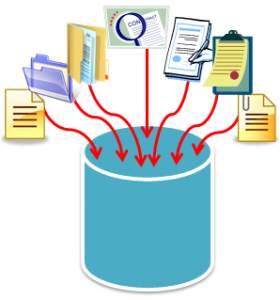 David Allen, a time-management expert, states that we all know that a computer is a powerful tool that can make our work easier, faster and more efficient–but few of us are realizing these objectives. Why not? We don’t achieve our goals for the same reason we can’t find the television remote or our car keys. We are human and most of us don’t actually organize our work and/or follow that organization all the time. Most of us spend approximately one third of our time just trying to find our “lost things” even if they are on the computer. This is especially true for computer workers who share data and processes with co-workers.
David Allen, a time-management expert, states that we all know that a computer is a powerful tool that can make our work easier, faster and more efficient–but few of us are realizing these objectives. Why not? We don’t achieve our goals for the same reason we can’t find the television remote or our car keys. We are human and most of us don’t actually organize our work and/or follow that organization all the time. Most of us spend approximately one third of our time just trying to find our “lost things” even if they are on the computer. This is especially true for computer workers who share data and processes with co-workers.
Category Archives: Collaboration
Where’s Your Data?
 So many people assume that critical project data is accessible and safe because different people on the team claim that “they have it covered” or “I know where it is.” However, in many cases, the data is not really centralized.
So many people assume that critical project data is accessible and safe because different people on the team claim that “they have it covered” or “I know where it is.” However, in many cases, the data is not really centralized.
Documents are scattered in different people’s personal folders, their desktop or somewhere in their email Inbox, or they consist of just a plain piece of paper. All of this means that the data is really sitting on multiple information islands. Scattered information happens when people do not work in a centralized program that manages all of the data for them. What if someone leaves for the day or forever? How do others find all the information they need? Usually with a frantic search punctuated by cries of “where is it??”
TweetWhat Type of Team is Your Organization?
 Although all companies are unique, each company has employees who work together. How those teams work together can vary greatly. Have you taken a look at your team dynamics lately?
Although all companies are unique, each company has employees who work together. How those teams work together can vary greatly. Have you taken a look at your team dynamics lately?
Does your company operate like a baseball team? Are you and your co-workers a bunch of superstars? Do you each work independently most of the time, each aware of company goals that you align with your personal goals? Does each superstar have his or her own timetable, striving to be the best at what he or she does?
Tweet“Oops! I Didn’t Know!!”
 Has this happened to you? Someone in a group meeting throws out an idea. You muse about it for the rest of the day, then do some work to make that idea happen. And then you find out that two other people are also working on it, each independently and unaware of your work. Or, perhaps worse, you find out that the other two people had a chat after the meeting and are collaborating on the work, duplicating or contradicting the work that you just spent hours on.
Has this happened to you? Someone in a group meeting throws out an idea. You muse about it for the rest of the day, then do some work to make that idea happen. And then you find out that two other people are also working on it, each independently and unaware of your work. Or, perhaps worse, you find out that the other two people had a chat after the meeting and are collaborating on the work, duplicating or contradicting the work that you just spent hours on.
In any group endeavor, communication is key and collaboration just makes sense. This is particularly true in the construction industry. On a construction project, there are many decisions that need to be made, much work to be done, and often, changes to the work along the way. Everyone involved needs to know what is going on, what work is needed now, and who is responsible for it.
Tweet